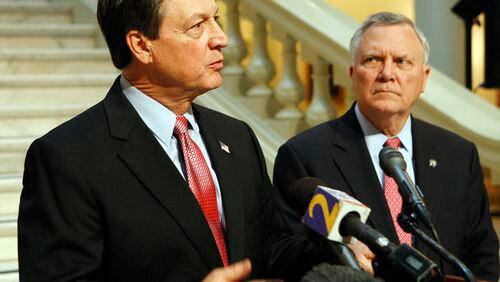Retiring U.S. Rep. Lynn Westmoreland’s last weeks in Washington have been nothing if not surreal.
His schedule has gotten lighter. One by one, members of his staff have moved on to new jobs. He suddenly has more time to spend on long-deferred honey-do projects at his Grantville home.
“It’s kind of like going to rehab,” Westmoreland, 66, said in a recent interview on Capitol Hill. “You’re so used to going from thing to thing. … It just takes a little bit of time to wind down.”
Westmoreland’s D.C. tenure officially ends Jan. 3 when former West Point Mayor Drew Ferguson is sworn in to replace him as the representative for Georgia’s 3rd Congressional District.
In the meantime, Westmoreland is winding down his 12-year stint in Washington, one that that saw him pivot from being a conservative bomb thrower to a leadership ally who once jokingly offered to share a houseboat with House Majority Leader Kevin McCarthy.
The six-term Republican was kicked out of his Capitol Hill office, which doubled as his sleeping quarters when Congress was in session, the week before Thanksgiving to make room for the new crop of lawmakers. So he’s spent his final weeks in Washington living in Airbnbs and wrapping up his legislative and constituent caseload from a cramped shared work space in the basement of a House office building.
He’s been absent from votes on the House floor since Election Day since he doesn’t believe outgoing lawmakers should vote as lame-duck members.
Quippy, back-slapping and gregarious, Westmoreland personifies the good ol’ boy modus operandi that was once inescapable across the South. But it was those very qualities that would get him into trouble in Washington.
He caught flak during the 2008 presidential campaign for calling Barack and Michelle Obama “uppity,” a racially charged term, and for saying the Confederate flag was not a racist symbol. He also was the subject of a memorable interview with an in-character Stephen Colbert in which he could not name the Ten Commandments.
That in part is why Westmorehand has no qualms about leaving Washington, a city in which he’s spent very little time outside of session since he arrived in 2005. He said the culture on Capitol Hill has taken a turn for the worse, due in no small part to the ubiquitous presence of social media.
“Everybody’s got a camera, everybody’s got a recorder, and what you say in a small group that’s terribly funny, that y’all are just going to roll around on the floor and laugh and clink glasses and high-five …. that on the front of a newspaper is not funny,” he said. “So from that perspective, there’s not any environment that you can be in politically where you feel totally safe.”
The road ahead
Westmoreland leaves Congress with his future uncertain.
He's looking to slow down and spend time with his seven grandchildren. He's also kicking the tires on a potential gubernatorial run 2018 — an open race that's drawn plenty of interest from both sides of the aisle. Westmoreland has been traveling the state on what he calls a "reconnect tour" as he gauges interest, but he said he likely won't make a decision until after the state Legislature's next session concludes in the spring.
“This thing, it’s just (got) a lot of moving pieces,” he said. “If I get a job making $5 million a year, then I’m probably not going to do it. At the same time, I feel like if there’s something I think that I’ve learned, that I feel like I could be beneficial to the state, I’ll probably do it.”
Kerwin Swint, a political science professor at Kennesaw State University, said the gubernatorial race will likely be a crowded one, with multiple well-known and well-funded candidates eyeing a run.
“I think for anyone it’s going to be potentially tough and it’s going to take a good bit of money, energy and organizing early on,” Swint said. “So for somebody like Lynn Westmoreland, the sooner he makes a decision the better off for him.”
Westmorleand has long been politically ambitious, but he’s also passed up some opportunities to move up the leadership chain.
He dipped his toe into running for U.S. House speaker amid the turmoil following John Boehner’s resignation in the fall of 2015, but he dropped the bid when Paul Ryan threw his hat into the ring. He could have been the first Republican state House speaker in modern Georgia history, but he passed on the opportunity in 2004 in order to run for the open congressional seat he later won.
Westmoreland was never known as a policy wonk. He was, however, a canny political tactician, skills he honed during his years as a party leader in the statehouse and later as head of the House GOP's recruitment and redistricting arms.
Should he opt out of running for governor, Westmoreland said he’s open to consulting on others’ political campaigns. But unlike many of his former colleagues, he has no interest in working as a lobbyist.
Fiscal fever
Westmoreland may be best known for his political touch, but taxes are what first got him involved in politics as a real estate developer and construction company owner. He ran in favor of eliminating the Internal Revenue Service and approving a system that would replace federal income, payroll and estate taxes with a national sales tax.
He quickly moved up the ranks after arriving in the Georgia House in 1993, becoming minority leader in 2001. Coincidentally, it was taxes that became the subject of his most famous tiff with Sonny Perdue, the Republican governor he helped elect.
Perdue came into office in 2003 facing a fiscal downturn and a tight timetable to prepare his first budget, and he asked the Legislature to raise alcohol and tobacco taxes. Westmoreland balked and led the effort to oppose the plan.
The battles were fierce as Republicans grappled with the proposal behind closed doors. Perdue eventually was able to pass a significantly scaled-down tax increase on tobacco alone.
“It’s been one of those painful things I’ve had to live with for a while, but I did the right thing,” Westmoreland said of the experience.
When he arrived in Washington, Westmoreland was something of a firebrand, but he eventually changed his strategy. He later became a member of the whip team, the arm of party leadership that counts votes. And among the young Republican members of Georgia’s congressional delegation, he took on somewhat of a big brother role.
With Westmoreland’s departure and the likely confirmation of Georgia colleague Tom Price as Donald Trump’s health secretary, the state loses its two most senior House Republicans during a time when party leaders are looking to capitalize on the first unified GOP government in a decade.
When asked whether he regrets the timing of his retirement announcement given the election results, Westmoreland shook his head.
“It’s just been such an awesome, awesome experience,” he said, “but sometimes when you’re watching a football game, sometimes you can see it better on TV than you can if you’re at the stadium.”
About the Author








